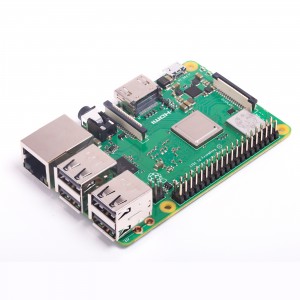Raspberry Pi explained in a nutshell

Below this text you can see a Raspberry Pi single board computer. On this board everything is built in that a computer needs - processor, memory (RAM), wireless network (WLAN) and connectors for peripherals (LAN, USB, HDMI).
There are several Raspberry Pi models, the one pictured to the right of this text is the Raspberry Pi Model 4B, currently the newest and fastest model.
Brief history of the Raspberry Pi
The Raspberry Pi Foundation introduced this very affordable and compact computer in 2012. The Raspberry Pi computer boards were intended to encourage kids and teens to get back into more experimentation and hands-on experience.
One of the main selling points has always been the low price ( $35 plus tax) for which the computer was offered.
Since the Raspberry Pi can also be used very versatile for electronics tinkering thanks to its GPIO header (the pin header with the 40 pins), it caught on in the hacker and maker scene.
Increasingly, industrial products and consumer electronics products are realized on the basis of the Raspberry Pi. We would be happy to advise you on the topic of Raspberry Pi in your product.
Advantages of the Raspberry Pi
- low power consumption
- compact
- silent operation
- solid and extensive code base
- large community, many tutorials online
- reasonable price
The Raspberry Pi becomes more powerful with each generation, and can already replace many old "PCs" advantageously. We would be happy to advise you on this.
Fields of application of the Raspberry Pi
The Raspberry Pi - in its various models and designs - can be used by many people in everyday life.
- Children, teenagers, maker and pensioners: for learning basic computer skills, programming, electronic tinkering
- Everybody: mini computers on the TV for streaming YouTube, and other media
- Medium-sized businesses & large corporations: replacing expensive PCs running Windows with compact, low-power Raspberry Pi-based thin clients. Using the Raspberry Pi to monitor industrial processes. And much more.
Unter diesem Text sehen Sie einen Raspberry Pi Einplatinencomputer. Auf dieser Platine ist alles verbaut, was ein Computer benötigt - Prozessor, Speicher (RAM), Funknetzwerk (WLAN) und Anschlüsse für Peripherie (LAN, USB, HDMI).
Es gibt verschiedene Raspberry Pi Modelle, das rechts von diesem Text abgebildete Modell ist der Raspberry Pi Model 4B, das aktuell neueste und schnellste Modell.
Kurze Geschichte des Raspberry Pi's
Die Raspberry Pi Foundation führte diesen sehr günstigen und kompakten Computer 2012 ein. Die Raspberry Pi Computerplatinen sollten Kinder und Jugendliche dazu animieren, wieder mehr zu experimentieren und praktische Erfahrung zu sammeln.
Eines der wichtigsten Verkaufsargumente war schon immer der günstige Preis ( 35 $ zzgl. Steuern) für den der Computer angeboten wurde.
Da der Raspberry Pi dank seines GPIO Headers (die Stifleiste mit den 40 Pins) sehr vielseitig auch für Elektronik-Basteleien verwendet werden kann, setzte er sich in der Hacker-und Maker-Szene durch.
Es werden zunehmend auch industrielle Produkte, und Consumer Elektronik-Produkte auf Basis des Raspberry Pi realisiert. Gerne können wir Sie zu dem Thema Raspberry Pi in Ihrem Produkt beraten.
Vorteile des Raspberry Pi
- geringer Stromverbrauch
- kompakt
- lautloser Betrieb
- solide und umfangreiche Codebasis
- große Community, viele Anleitungen online
- günstiger Preis
Der Raspberry Pi wird mit jeder Generation leistungsfähiger, und kann bereits heute viele alte "PCs" vorteilhaft ersetzen. Gerne können wir Sie dazu beraten.
Einsatzgebiete des Raspberry Pi's
Der Raspberry Pi kann - in seinen verschiedenen Modellen und Ausführungen - von vielen Menschen im Alltag sinnvoll eingesetzt werden.
- Kinder, Jugendliche, Maker und Rentner: zum Lernen von grundlegenden Computer-Fertigkeiten, Programmieren, Elektronik-Basteleien
- Jedermann: Mini-Computer am Fernseher für Streamen von YouTube, und anderen Medien
- Mittelständische Unternehmen & Großkonzerne: Ersatz von teuren PCs mit Windows durch kompakte, stromsparende Thin-Clients auf Raspberry Pi Basis. Einsatz des Raspberry Pi zum überwachen von Industrieprozessen. U.v.m.

Raspberry Pi 3 Model B+ (Single Board Computer)
